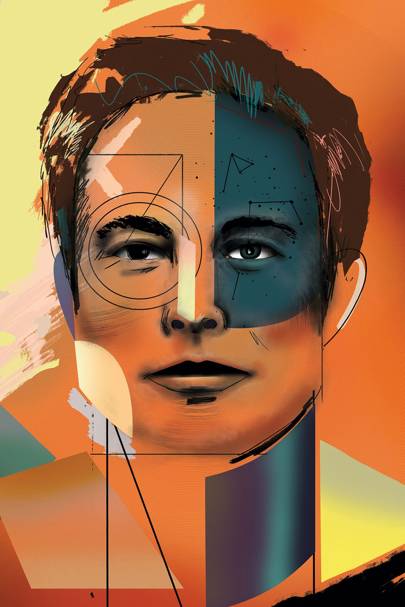Elon Musk, of SpaceX, Tesla, SolarCity and OpenAI is number one in the WIRED 100
ILOVEDUST
- Elon Musk
Founder, CEO and CTO, SpaceX; co-founder, CEO and product architect, Tesla Motors; chairman, SolarCity; co-chairman, OpenAI, Los Angeles
For a man desperate to escape planet Earth, Elon Musk is awfully concerned with preserving it - whether saving it from the ravages of out-of-control artificial intelligence (AI) or humanity's own self-destructive inability to limit energy consumption. A good thing, given that, although the SpaceX founder and CEO may be planning to establish a Martian colony in our lifetime, few of us will be able to afford the ticket.
Musk's many nominations for the WIRED 100 were focused not simply on his work to push the limits of human space exploration, but also on his Earth-bound efforts as founder and CEO of Tesla to change the way we move around this planet, by making electric vehicles desirable, increasingly affordable, and eventually capable of driving themselves. To fuel the vehicles of the future, Musk's Gigafactory in Nevada aims to produce more batteries annually by 2020 than were produced worldwide in 2013. Batteries destined not only for cars but also for homes and businesses, providing the storage capacity needed to support the variable output of solar or wind energy. Silicon Valley billionaires often talk about making the world a better place, but few back their dream so boldly as Musk, 45. In the past year, he's live-streamed successful launches and retrievals of his reusable Falcon 9 rocket; started selling the Tesla Model X all-electric SUV and unveiled the prototype for his mass-market Model 3 (Musk pointed out that the model types for his three cars to date spelled S3X); announced a competition to test designs for his Hyperloop high-speed transportation system - which uses reduced-pressure tubes to reach speeds around 970kph; and launched his not-for-profit AI research company OpenAI, with the aim of both advancing the field and making AI research freely accessible.
So, if Tesla's autonomous cars do turn against us, at least we'll know how they work. In December 2015, figures from GTM Research showed Musk's green-power company SolarCity accounted for 34 per cent of the residential solar panel installations in the US, making it the market leader. Each one of these alone would be enough for most billionaires. For Musk, they just fuel his ambition (and in June Tesla bid to take over SolarCity). His sense of urgency can be palpable - he's known for being brusque, leaping from topic to topic in conversations, impatient with those who can't keep up. All of which underlines Iron Man director Jon Favreau's use of Musk as the inspiration behind maverick tech billionaire Tony Stark. Although he's not yet working on an armoured suit, in many ways Musk is starting to look a lot less like the typical Silicon Valley player and a lot more like an old-school industrialist.
He's investing his own fortune gained from founding and selling city guide startup Zip2 and online payments pioneer PayPal, but also openly accepting significant government subsidy for SpaceX, Tesla and SolarCity in the same way gilded-era railroad barons accepted federal support to build transport infrastructure. Falcon 1, launched in 2008, was the first privately funded rocket to reach orbit - followed by the launch and recovery of Dragon, the future replacement for the Space Shuttle. He hopes to send humans to Mars within ten to 20 years, which seems an achievable goal next to persuading Americans to swap their beloved gas-guzzling road monsters for nimble electrical vehicles. But with advance orders for the Model 3 topping $10 billion (£6.9bn) in the first two days after orders opened in spring 2016, it looks like he might have a chance. It's notable that, after warning against the dangers of AI - in a joint letter with Stephen Hawking last January that argued that its benefits could be outweighed by its potential to destroy the human race - Musk's OpenAI aims to open-source AI research in a bid reduce the risk of this apocalypse.
With fellow billionaires Peter Thiel, Google founders Larry Page and Sergey Brin, and Oracle founder Larry Ellison embracing the promise of singularity, Musk's stance looks optimistically pro-human.
He may not be Tony Stark, but he can't stop trying to save us all.
